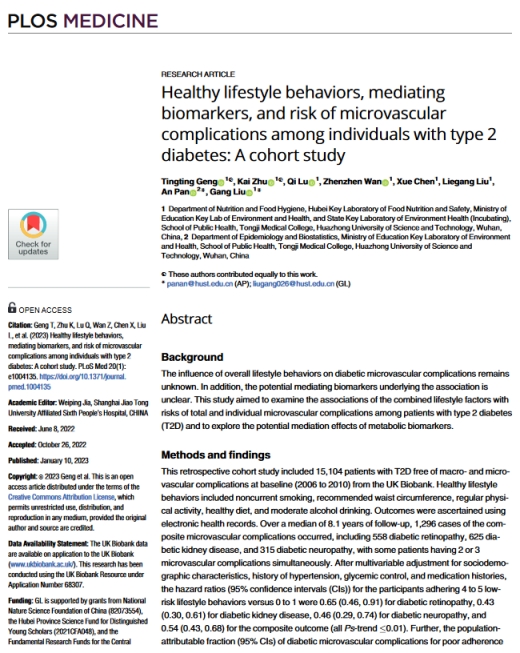
On January 10, 2023, PLoS Medicine, an authoritative journal in medicine, published online the latest research results of Professor Liu Gang's team from the School of Public Health, entitled "Healthy lifestyle behaviors, mediating biomarkers, and risk of microvascular complications among individuals with type 2 diabetes: A cohort study". Geng Tingting (post-doctor student) and Zhu Kai (doctoral student) from the School of Public Health are co-first authors, and Prof. Liu Gang and Prof. Pan An are co-corresponding authors.
Type 2 diabetes (T2D) has become a major public health problem worldwide. The total number of adult diabetes patients worldwide reached 537 million in 2021. Diabetes, as a progressive disease, can lead to many health complications, including macrovascular and microvascular diseases. Diabetic microvascular complications, such as diabetic retinopathy, diabetic nephropathy, and diabetic neuropathy, can cause a profound impact on patients' overall quality of life. Therefore, it is paramount to develop effective strategies to prevent or delay the development of microvascular complications in individuals with diabetes.
Apart from the glucose control by medications, healthy lifestyles, such as high-quality diet, no smoking, moderate alcohol intake, normal weight, and physical activity, have played a fundamental role in managing diabetes. However, the association between combined healthy lifestyle factors and the development of microvascular complications in diabetes has not yet been clarified. In addition, whether these metabolic biomarkers have mediating effect during the association between lifestyle behaviors and diabetic microvascular complications remains unclear.
The study included five lifestyle behaviors: waist circumference, smoking status, physical activity, habitual diet, and alcohol intake.
Definition of comprehensive healthy lifestyle factors in the study:
Healthy waist circumference (<80 cm for women or <94 cm for men).
No current smoking.
Moderate drinking (0 to 14 g/day for women or 0 to 28 g/day for men).
Active physical exercise (among the top 1/3 of the population’s physical activity level).
Healthy diet (greater than or equal to 5 of the following 10 dietary components meet the ideal intake level: fruits, vegetables, whole grains, fish, dairy products, vegetable oils, refined grains, processed meat, unprocessed meat, and sugar-sweetened beverages).
Participants with each low-risk behavior were assigned 1 point; otherwise, 0 points. The overall healthy lifestyle score was the sum of the individual scores of the 5 lifestyle behaviors, ranging from 0 to 5.
A total of 15,104 patients with T2D were included in this study, with a median follow-up of 8.1 years. The main findings after adjusting for demographic factors, duration of diabetes, glycemic control status, and use of antihyperglycemic or lipid-lowering agents are as follows:
Compared with participants with 0 to 1 low-risk lifestyle behavior, participants with 4 to 5 low-risk lifestyle behaviors had a 35% lower risk of diabetic retinopathy, 57% lower risk of diabetic kidney disease, 54% lower risk of diabetic neuropathy, and 46% lower risk of the composite outcome.
The result of population-attributable fractions indicated that about 1/4 of the diabetic microvascular complications could theoretically be avoided if all participants adhered to 4 or more low-risk lifestyle behaviors.
Six biomarkers of glycemic control, systemic inflammation, liver function, and lipid profile partially mediated the association between overall healthy lifestyle score and diabetic microvascular complications, with a total mediating proportion of 23.2%.

In addition, Prof. Liu Gang cooperated with the Harvard University team, conducting relevant research based on the U.S. Nurses Health cohort and the Health Professionals Follow-Up cohort. The preponderance of the cohort mentioned above mainly lies in having information on patients with diabetes before and after diagnosis. The research results were published in JAMA Network Open on January 26, 2023, titled "Adherence to a Healthy Lifestyle in Association with Microvascular Complications Among Adults with Type 2 Diabetes".
This cohort study included 7,077 participants with T2D. After adjustment of multiple potential confounding factors, the team found that adherence to healthy lifestyle before or after diabetes diagnosis was associated with lower risks of microvascular complications.
After the diabetes diagnosis, participants with a low-risk lifestyle score greater than or equal to four had a 35% lower risk of diabetic retinopathy, 43% lower diabetic nephropathy, 33% lower diabetic neuropathy, and 32% lower risk of the composite outcome compared to those with a score of 0. In addition, similar results were observed for adherence to a healthy lifestyle before diabetes diagnosis.
The study found that greater improvements in lifestyle factors after diabetes diagnosis were also associated with a lower risk of microvascular events.
The two studies above both suggested that adherence to a comprehensive healthy lifestyle helps to reduce the risk of microvascular complications in patients with T2D. was associated with a significantly lower risk of microvascular complications in patients with T2D, and the favorable associations were partially mediated through improving the metabolic indicators related to blood glucose, blood lipids, inflammation, and liver function. improving biomarkers of glycemic control, systemic inflammation, liver function, and lipid profile. These findings provide an essential scientific basis for the health management of T2D patients.
Source: School of Public Health, Tongji Medical College
Written by: Zhu Kai
Photograph by: Zhu Kai
Edited by: Lu Yizhong, Chang Wen, Peng Yumeng
